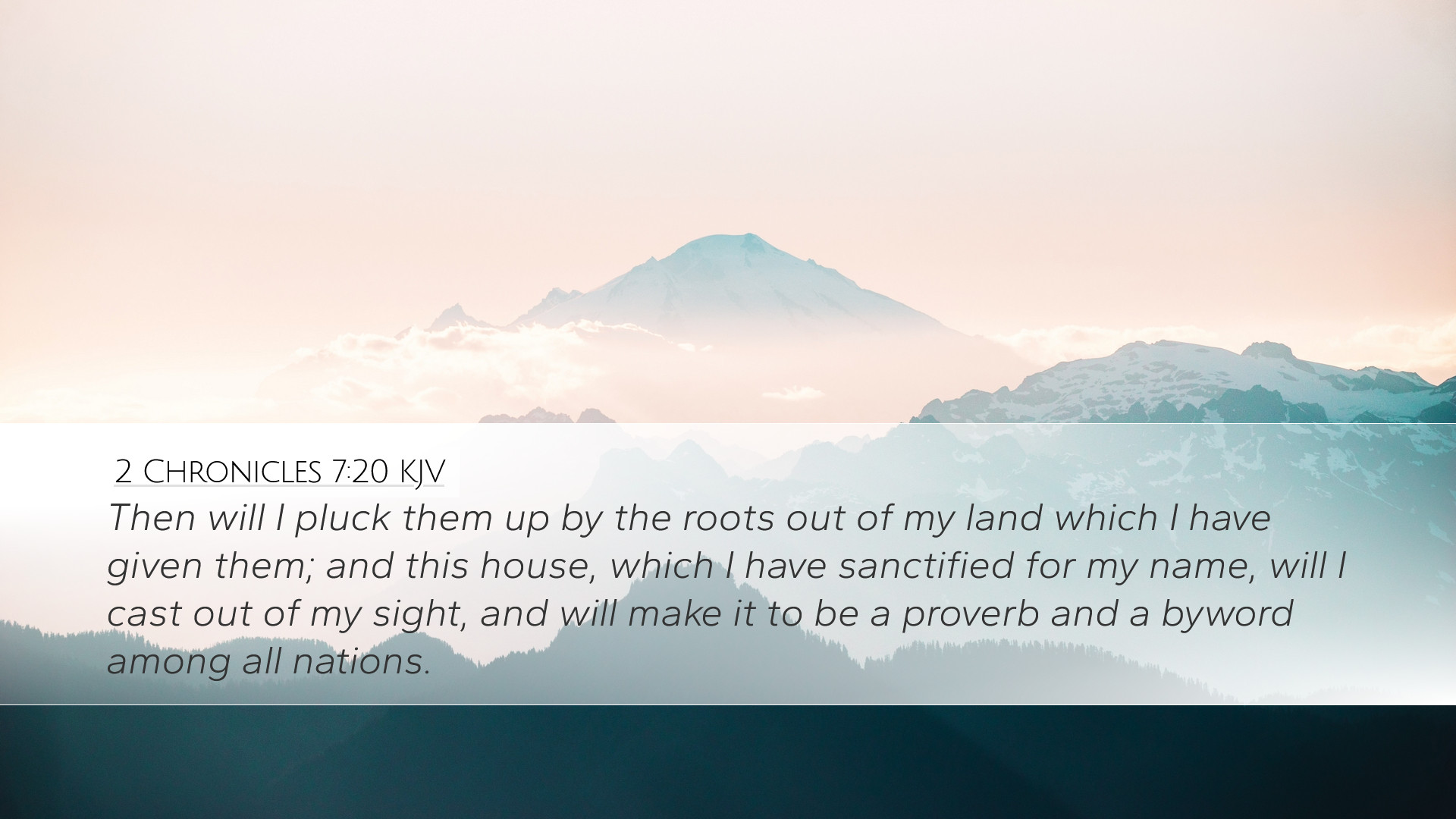Commentary on 2 Chronicles 7:20
Verse: 2 Chronicles 7:20 - "Then will I pluck them up by the roots out of my land which I have given them; and this house, which I have sanctified for my name, will I cast out of my sight, and will make it to be a proverb and a byword among all nations."
Introduction
This verse serves as a profound warning from God to Israel, emphasizing the grave consequences of disobedience and idolatry. In the broader context of Solomon's dedication of the Temple, it underscores the covenantal relationship between God and His people, highlighting the blessings associated with obedience and the dire penalties for rebellion.
Theological Significance
Matthew Henry's Perspective:
Henry notes that this verse reflects God’s holiness and justice. The promise of blessings (in the preceding verses) stands in stark contrast to the threats posed in this verse, indicating that the same God who blesses also judges. When the Israelites turn away from Him, they would be cut off from the land He provided them.
Albert Barnes' Insights:
Barnes emphasizes that the "rooting up" signifies a total and utter destruction, not merely a superficial removal. The land, a gift from God, becomes a source of judgment when its inhabitants forsake the Lord. This underscores God's sovereignty and the seriousness of violating the covenant He established.
Adam Clarke's Commentary:
Clarke interprets this verse as a stern admonition that the Temple, once sanctified for God’s name, could become a place of reproach if the people stray. He connects this with the notion of divine retribution, where a once-holy place becomes a derision among the nations, highlighting the critical need for faithfulness to God.
Contextual Analysis
The historical context of this verse is paramount in understanding its gravity. Following Solomon's prayer of dedication (2 Chronicles 6), God appears to Solomon and promises His presence in the Temple. However, the subsequent conditional promise – blessings for obedience and curses for disobedience – places the responsibility on the people of Israel.
- Covenantal Relationship: This discourse reaffirms the covenant made with Israel, reiterating that faithfulness to God leads to sustained blessings, while unfaithfulness results in dire consequences.
- Historical Warning: The language of being "plucked up by the roots" is reminiscent of Israel’s eventual exile. This serves as a prophetic foreshadowing of events that would unfold in their history.
- Spiritual Implications: The Temple's fate illustrates that spiritual decline can lead to tangible consequences within the community of faith, urging leaders and believers alike to maintain faithfulness.
Practical Applications
For Pastors and Church Leaders:
This verse calls for vigilance in leadership. It reminds pastoral leaders to guide their congregations towards spiritual fidelity and to caution against complacency that might lead to spiritual decay.
For Theological Students:
This passage presents an excellent case study on the nature of God's covenant, the significance of obedience, and the implications of disobedience. Students are encouraged to delve deeper into the historical context and theological ramifications of this scripture.
For Scholars and Theologians:
A critical examination of this verse sheds light on the understanding of divine justice and mercy. Scholars may analyze the balance between God’s grace and His holiness, as well as the prophetic implications of this verse in the grand narrative of Scripture.
Conclusion
2 Chronicles 7:20 stands as a sobering reminder of the seriousness of the covenant relationship that God has with His people. It conveys the message that while God's love and blessings are abundant for those who obey Him, His justice is equally stern for those who turn away. The implications of this passage resonate throughout the ages, reminding believers of the need to remain faithful to the God who has so richly blessed them.


